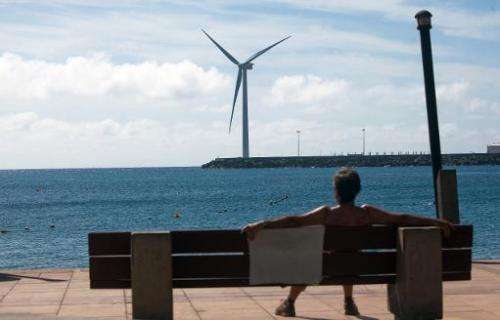A woman sits on a bench backdropped by Spain's largest wind turbine. in the port of Arinaga, on Gran Canaria in the Spanish archipelago of the Canary Islands on October 20, 2013
Spain launched its first offshore wind turbine Monday, offering a moment of fleeting pride to an industry flagging from a decline in state support.
The five megawatt turbine has been erected at the end of a dyke in the port of Arinaga on Gran Canaria in the Spanish archipelago of the Canary Islands.
Standing 154 metres (505 feet tall) with 62.5-metre (205-feet) long blades, it can supply the annual energy needs of 7,500 homes.
After a trial that began in July, it should obtain its certification in about March 2014, allowing it to be deployed to the electrical grid.
The turbine "highlights the government's entire energy policy", Industry Minister Jose Manuel Soria said at the official opening.
"In the first half of the year, more than half of all the electricity produced in Spain came from renewable sources," he said.
Spain is ranked number four in the world in terms of the installed capacity of its wind energy.
But "let's not kill this industry," pleaded Ignacio Martin, executive president of the Spanish group Gamesa, which made the turbine.
The sector, which has long enjoyed state subsidies, has suffered a plunge in support in recent years as Spain implements austerity policies to drive down its annual budget shortfalls.
As a result, "100 percent" of new wind turbines are now installed outside of Spain, said Martin.
The Gamesa chief stressed the potential of offshore wind. "Even if the industry is still taking its first faltering steps, it is worth betting on," he said.
Though Spain has 8,000 kilometres (5,000 miles) of coastline, it is unlikely to boast wind turbines in the near future because the surrounding seas are too deep.
The prototype launched Monday is aimed more at the North Sea where most European offshore wind turbine projects are now based.
"But that does not mean we won't be capable of making the technological development here," Martin said, urging more government aid for such prototypes.
The business could also be important for jobs in Spain, with all parts of the turbine manufactured in Spanish factories by Gamesa, which has more than 4,000 employees. Spain's unemployment rate is 26.3 percent.
© 2013 AFP
























